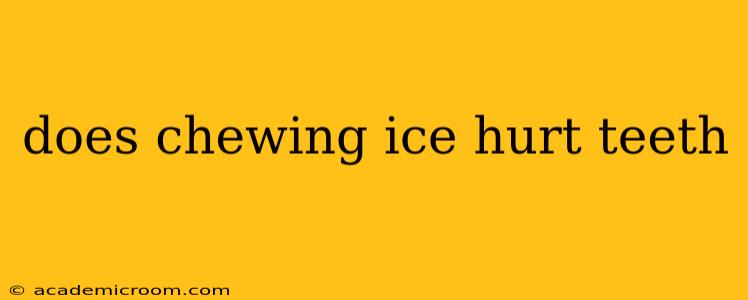Does Chewing Ice Hurt Teeth? The Chilling Truth
Many people enjoy the satisfying crunch of chewing ice, but is this habit damaging to your teeth? The short answer is: yes, chewing ice can definitely hurt your teeth. While the occasional chip might seem insignificant, consistently crunching on ice cubes can lead to a range of dental problems, impacting both the enamel and the underlying dentin. Let's delve into the specifics.
How Does Chewing Ice Damage Teeth?
Ice is incredibly hard. When you bite down on an ice cube, the force exerted, combined with the hardness of the ice, can cause significant damage to your tooth enamel – the hard, outer layer that protects your teeth. This damage manifests in several ways:
- Cracks and Chips: The most immediate damage is the fracturing of the enamel. Small cracks might be imperceptible at first, but they can worsen over time, leading to larger chips and eventually, more significant structural damage.
- Enamel Wear: Repeated chewing of ice causes gradual abrasion of the enamel, making your teeth more susceptible to cavities, sensitivity, and discoloration. The enamel, once worn, cannot regenerate.
- Increased Sensitivity: As the enamel wears away, the underlying dentin (a softer layer beneath the enamel) becomes exposed. Dentin contains tiny tubules that lead to the nerve of the tooth, making your teeth extremely sensitive to hot, cold, sweet, and acidic foods and drinks.
- Tooth Fractures: In severe cases, the force of chewing ice can lead to more substantial tooth fractures, requiring extensive dental work, including fillings, crowns, or even root canals.
What are the long-term effects of chewing ice?
The cumulative effect of regularly chewing ice is a significant increase in the risk of various dental problems. This includes:
- Increased Cavities: Damaged enamel is more vulnerable to bacterial attack, leading to increased susceptibility to cavities.
- Discoloration: As enamel wears down, the underlying dentin becomes more visible, potentially causing your teeth to appear discolored or yellowed.
- Expensive Dental Procedures: Repairing ice-induced damage can be costly. Filling cavities, replacing crowns, and root canal treatments are all expensive procedures that could have been avoided.
Why do people chew ice?
Understanding the underlying reasons why people chew ice can help in addressing the habit. Some potential reasons include:
- Habit: It can be a nervous habit or a way to cope with stress or boredom.
- Nutritional Deficiency: Some people chew ice due to iron deficiency anemia. While this isn't a proven cause for everyone, it's worth considering if you have other symptoms.
- Pleasure: Some simply find the sensation pleasurable.
How can I stop chewing ice?
Breaking the habit requires conscious effort and finding alternative ways to satisfy the urge. Consider these options:
- Identify your trigger: What situations lead you to chew ice? Once you pinpoint your triggers, you can develop coping mechanisms.
- Find a substitute: Try chewing sugar-free gum or eating crunchy fruits and vegetables instead.
- Oral Rehydration: Dehydration can sometimes lead to ice chewing. Ensure you are drinking enough water throughout the day.
- Seek professional help: If you struggle to break the habit on your own, consider seeking help from a therapist or counselor.
Is it okay to chew ice occasionally?
While the occasional ice chip probably won't cause immediate harm, it's best to avoid making it a habit. The cumulative effect of chewing ice over time far outweighs any fleeting pleasure it might provide.
By understanding the potential consequences and adopting preventative measures, you can safeguard your teeth and maintain a healthy smile for years to come. Remember, your teeth are an investment worth protecting.
